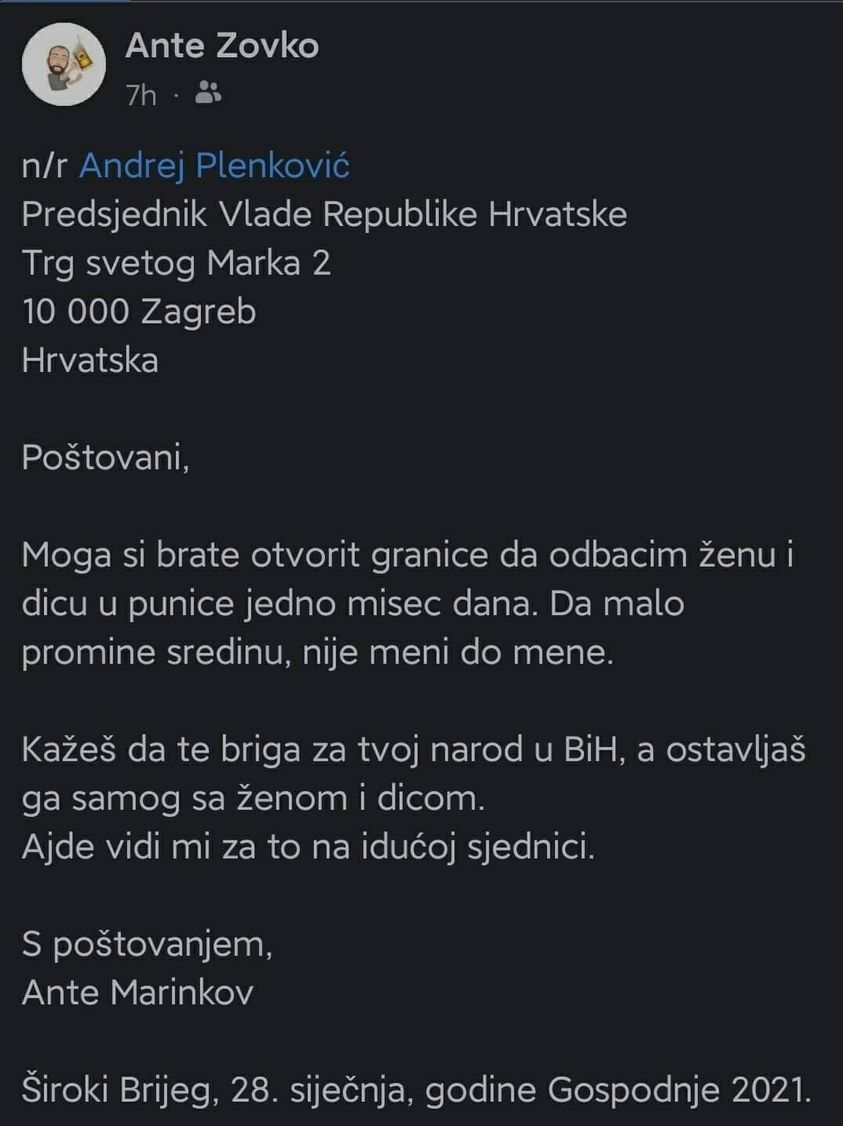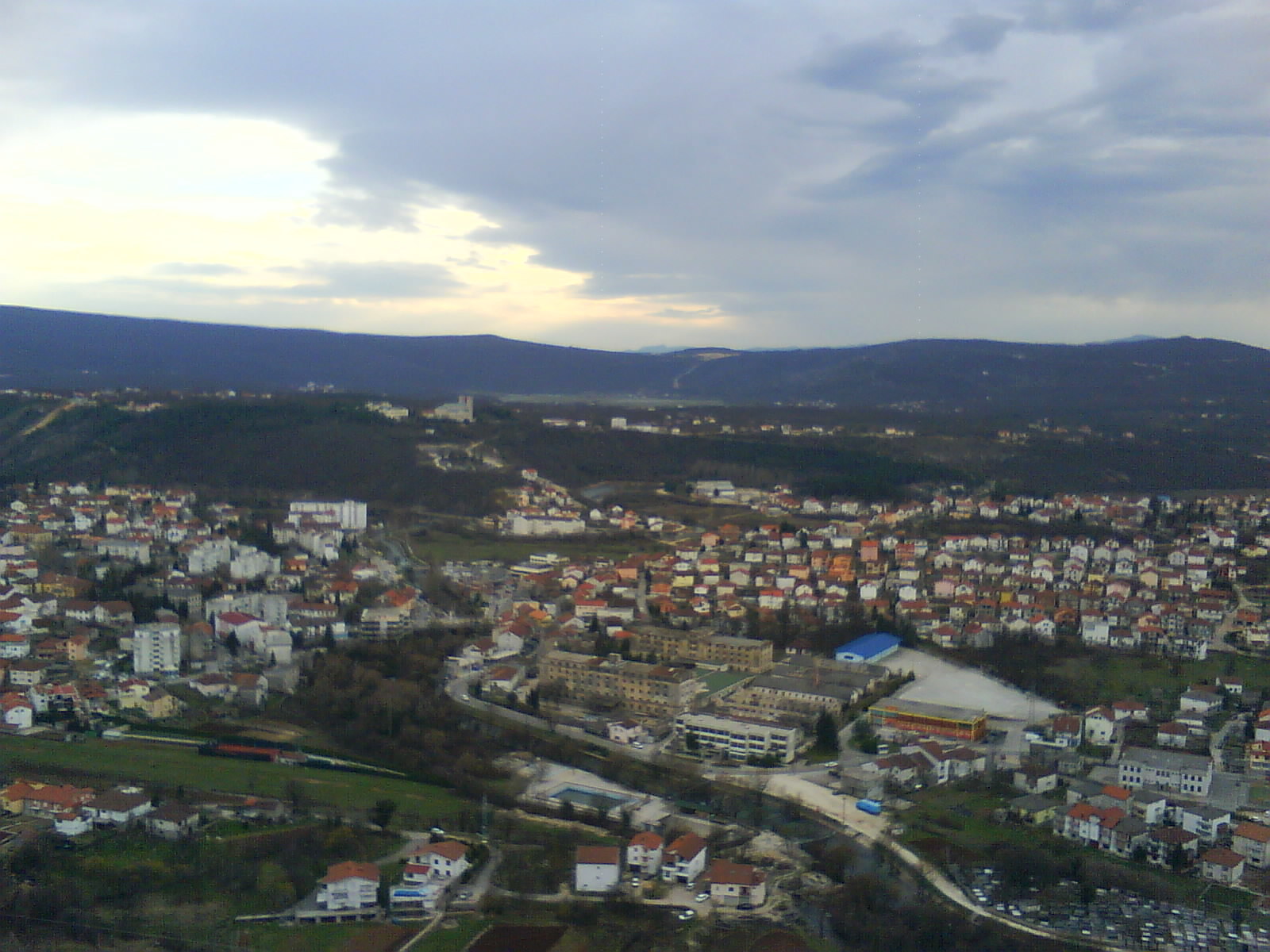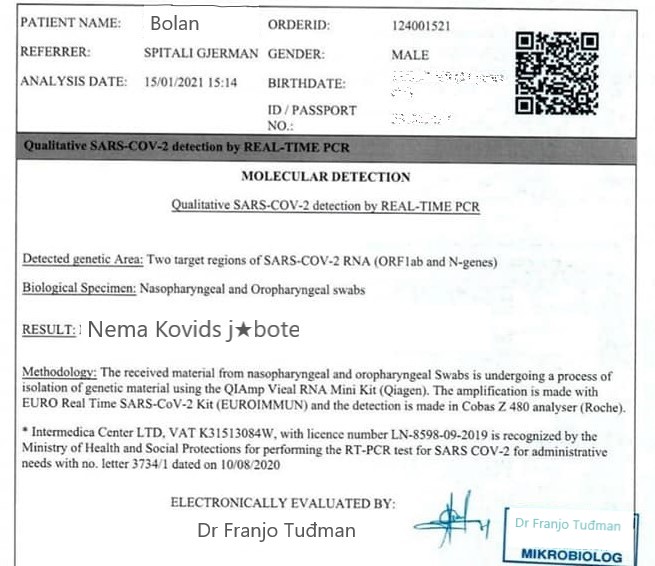Pressure of Illegal Migrants on Croatia-BiH Border Decreasing
ZAGREB, 12 April 2022 - The number of illegal migrants trying to enter Croatia from Una-Sava Canton in the west of Bosnia and Herzegovina has been steadily decreasing as migrants have been looking for other routes to reach EU countries, according to estimates by government bodies and local police in west Bosnia.
According to police data, there are currently slightly more than 2,800 illegal migrants in that part of Bosnia and Herzegovina, and they are mostly from African and Asian countries.
Around 850 of them are accommodated in three reception centres and slightly more than 1,800 are staying in makeshift accommodation in Bihać, Cazin and Velika Kladuša or in illegal camps along the border with Croatia.
UNA-Sana Canton ministry of the interior spokesman Adnan Beganović has confirmed to the Banja Luka-based Nezavisne Novine paper that local police still control roads leading to that part of the country to prevent the arrival of new migrants.
He said that that way in 2021 police prevented the arrival of around 17,000 migrants, which is why the number of those trying to reach Croatia along that route has been declining.
"Currently the number of migrants leaving Una-Sana Canton is higher than the number of migrants arriving here. Those who do not manage to cross the border into Croatia are returning to Sarajevo or Serbia and looking for another route to reach Western European countries," Beganović said.
Building Bridges Between Croatia, Bosnia and Serbia
February 18, 2021 – Appropriate government bodies of the three neighbours have come together and agreed to work together to improve bridges between Croatia, Bosnia and Serbia
We say building bridges between Croatia, Bosnia and Herzegovina and Serbia. It's actually more a case of renovating and maintaining bridges between Croatia and the two neighbours to the east.
Despite what journalist Zdenko Jurilj describes as “constant political skirmishes” between the neighbours, in Vecernji List's coverage of this news, the Bosnia and Herzegovina Council of Ministers and the governments of Croatia and Serbia have reached an agreement to work together in the rebuilding, maintenance and review of bridges which connect them. According to the signed agreement, each party will share 50% of the costs without, as it says, "claiming compensation from the other party, unless otherwise agreed between them."
In other words, the cost of renovating bridges between Croatia and Bosnia will be half paid by Bosnia, half paid by Croatia, the cost of renovating bridges between Bosnia and Serbia will be half paid by Serbia, half paid by Bosnia.
According to the agreement between the three governments, equipment needed for the reconstruction and maintenance of the bridges will be exempt from customs duties. Bridge managers shall make a detailed inspection of each of the bridges at least once every five years and independent experts appointed by the bridges' trustees will inspect them each year.
There are 10 bridges between Croatia and Bosnia and Herzegovina which will be jointly maintained. Most of them stretch between the countries across the Sava river, although a few cross over the Una, Maljevac and Korana rivers. A further 11 bridges between Serbia and Bosnia are within the agreement, making a total of 21 bridges to exist within the deal.
Although there are bridges between Croatia and Serbia (including at Ilok and Erdut in Slavonia), within the article published by Vecernji List there is no mention of an agreement to improve bridges between Croatia and Serbia. Following the optimistic and uplifting promise of the headline at the start of this news item, this fact is a rather more unfortunate metaphor on which to end it.
For the latest travel info, bookmark our main travel info article, which is updated daily.
Read the Croatian Travel Update in your language - now available in 24 languages
Hercegovac Begs Cro PM 'Open Borders So I Can Send My Wife To Her Mother'
January 29, 2021 – Lockdown is apparently taking a toll on one Hercegovac. The man from Široki Brijeg wrote to Croatian Prime Minister Andrej Plenković and begged him to reopen the borders between Croatia and Herzegovina so he could eject his wife from the family home for a month and send her to his mother-in-law's
The message from Hercegovac Ante Zovko (Ante Marinkov) was reposted on the Facebook page Imocki crnjaci where it picked up some 3 thousand likes in less than 6 hours.
The town, Široki Brijeg, where this particular Hercegovac (a man from Herzegovina) lives is just 35 kilometres from the border with Croatia. Lots of Croatians live in this area, including this Hercegovac, his wife and his child. But not, it would seem, his wife's mother, who apparently lives in Croatia. Široki Brijeg in Herzegovina, around 35 kilometres across the border from Croatia © Anto (talk)
Široki Brijeg in Herzegovina, around 35 kilometres across the border from Croatia © Anto (talk)
The Hercegovac's reason for wishing to eject his wife and child for a month was to change up the atmosphere for a time. One presumes he was not being entirely serious with his request.
The Hercegovac is not the first man to seemingly reach the end of his tether while restricted to staying in the family home. In April 2020, after just one month of being housebound, a man from a village near Osijek in Slavonia left his wife in the family home and went to live nearby in a tent.
Speaking anonymously at the time, the man's neighbour told the local SiB.hr news portal the couple have been happily married for 30 years. But, it seems the pressure of being around each other so closely during the lockdown was too much even for their strong union.
The neighbour was happy to report that since his friend pitched his tent in the nearby locale, relations between the man and his wife had actually returned to their usual levels of warmth and friendliness. The wife even came regularly to visit her husband in his tent. © John Waring
© John Waring
"My neighbour has been in his tent for a few days now,” he told the portal back in April. “He puts up a table and chairs in front. Occasionally our other neighbour comes over to drink some rakija (with him). I visited him too.”
The neighbour said his friend had quit the family home due to boredom more than anything else. Even after being happily married for 30 years, being around each other 24 hours a day was apparently just too much.
Perhaps in this more chivalrous response from the Slavonian man, Hercegovac Ante Marinkov could take some inspiration? After all, it's surely easier if one person departs from his family home in order to change the atmosphere than if two are forced to leave. Ante should find a nice spot in the fields nearby – not too close – and simply pitch up a tent. Problem solved! If he's lucky, his wife might come to visit bringing rakija.
45 People With Fake PCR Tests Detained At Croatian Border In One Weekend
January 19, 2021 – 45 people tried to enter Croatia with fake PCR tests this weekend alone. They were caught by Croatian police, detained at the border and reported to the State's Attorney office. If found guilty, each faces a maximum penalty of three years in prison
Some 45 people tried to enter Croatia through the borders of one county with fake PCR tests this past weekend.
Travel from Bosnia and Herzegovina into Croatia currently requires the production of a negative PCR test or a doctor's certificate proving you have successfully passed through a COVID-19 infection in recent months.
Since the ban on entering Croatia from Bosnia and Herzegovina without a negative PCR test was introduced, fake PCR tests are increasingly being forged. Border police and customs officers at crossings in Brod-Posavina County have met many people trying to cross the border with fake PCR tests. But, this weekend a new record number of forged tests were found on the county's border crossings.
According to a statement from the Brod-Posavina Police Department, as many as 45 attempts to enter the country with fake PCR tests were discovered on Saturday and Sunday.
"At the Stara Gradiška border crossing, police officers determined that 43 persons, mostly citizens of Bosnia and Herzegovina, presented fake PCR tests issued in BiH at the border control. At the Slavonski Brod border crossing, two people were registered who gave forged tests," the Brod-Posavina police reported.
Police officers file criminal charges against all those suspected of committing the criminal offence of forgery of a document with the Municipal State Attorney's Office in Slavonski Brod. If found guilty, such persons face up to three years in prison.
The overall number of people detained on Croatia's border with fake PCR tests this weekend could actually be higher - the figures of 45 persons detained with fake PCR tests were released by the police of just one county in Croatia - Brod-Posavina County. A further eight Croatian counties exist along the border with Bosnia and Herzegovina. Each has border crossings between the two countries.
EU Silence on Sickening Scenes at Croatian Border - EUobserver
ZAGREB, June 24, 2020 - Those working with refugees and migrants in Bosnia and Herzegovina, close to the Croatian border, have become accustomed to seeing shocking scenes. People are frequently forced back across the border, beaten, stripped, having had their documents burned, or having had dogs set on them.
But men returning with orange crosses spray-painted on their heads or brutally beaten and smeared with food represented a new, dark, low, read an article in EUobserver.
The incidents, originally documented by local NGOs and Amnesty International, and recently reported by The Guardian and EUobserver, were confirmed by various international humanitarian organisations supporting refugees and migrants in the camps in Una-Sana Canton near the Croatian border, reads the article on the independent news portal covering the EU.
"The pictures are chilling; the lack of an EU response even more so," says the author of the article in EUobserver, stressing that impunity is the norm at the border and that reports of violence by Croatian police continue to go unchecked.
"The humiliation of people seeking safety in Europe by painting crosses on their heads is just the latest in a long list of incidents, and a symptom of a wider trend of violent pushbacks and other severe human rights violations taking place at the EU's external borders, which we also observe in Bulgaria, Hungary, and Greece.
"The failure of EU institutions to call out individual member states for their unlawful behaviour has allowed these practices to flourish and encouraged further heavy-handed deterrence tactics by some countries.
"Despite lockdowns across Europe due to the Covid-19 pandemic, pushbacks from Croatia into Bosnia and Herzegovina continued in early 2020, with NGO monitors recording over 1,600 recorded incidents of migrants being pushed back in April alone.
"Men, women, teenagers, and entire families have been assaulted, physically abused, subjected to arbitrary detention, and their belongings destroyed.
"Refugees and migrants have consistently reported how police stripped them of their clothes and shoes and forced them to walk for kilometers in bad weather back to the Bosnian border.
"These are not isolated events. The sheer number of cases and consistency of allegations point to a systematic and deliberate policy on the part of the Croatian authorities," says EUobserver.
Croatian authorities inevitably deny incidents
Simultaneously, there have been cases of hate speech and intolerance towards refugees and migrants across the region - including attempts to portray them as the main carriers of coronavirus and a threat to public health.
The Schengen border code, which sets out rules on the control of EU borders, explicitly states that border checks should be carried out with full respect for human dignity.
Yet, the European Commission's silence over the distressing events at Croatia's borders is deafening, says EUobserver.
There has been no public denunciation, no call for the Croatian government to properly investigate the evidence or serious attempt to engage in independent monitoring, EUobserver says, adding that repeated calls by the European Parliament to investigate the abuses have been met by a tepid response, weakly pointing at difficulties in verifying claims and Croatian authorities' inevitable denial of any wrongdoing.
"Where does the EU draw the line if these widespread abuses can continue with impunity?" EUobserver wonders, adding that credible reports of hundreds of incidents documenting unlawful practices and violence at the EU's external borders should prompt effective independent monitoring, transparent investigations, and accountability for blatant breaches of EU law.
"If the European Commission is seriously committed to its fundamental values, it is time that it puts words into practice and decisively condemns unlawful returns and violence at its external borders and demands that perpetrators of such illegal acts are held to account," the article concludes.
PM Says Is Opposed To Wire Fence On Croatia-Bosnia Border
ZAGREB, June 5, 2020 - Prime Minister Andrej Plenkovic said on Friday in Mostar, southern Bosnia and Herzegovina, that he is opposed to a wire fence on the border between Croatia and Bosnia and Herzegovina after the migrant crisis has once again escalated.
Over the past few weeks, the number of migrants coming to Bosnia and Herzegovina has increased once again, and they are trying to reach European Union members passing through Croatia. Bosnia and Herzegovina's Security Minister Fahrudin Radoncic resigned earlier this week due to a difference in opinion in the ruling coalition with regard to resolving the migrant problem.
Plenkovic, who today met with the leader of the Croatian Democratic Union's sister party in Bosnia and Herzegovina - HDZ BiH, Dragan Covic, said that the solution cannot lie in building physical obstacles on the border.
"I am opposed to erecting wire fences between Croatia and Bosnia and Herzegovina. We are two neighboring countries directed to each other and a message like that would not be good," underscored Plenkovic.
He believes that it is key to resolve the migrant crisis on the Greece-Turkey border.
Strengthening the status of Croats in Bosnia and Herzegovina
Plenkovic underscored the need to strengthen the status of Croats in that Bosnia and Herzegovina.
"We will do everything so that the status of Croats in Bosnia and Herzegovina is not weakened, just the opposite, that it is strengthened. We are constantly working on that and I think that we have more than clearly communicated the topic of the equality of Croats at all levels of the Council of the EU and the European Commission," he told a press conference held together with Covic.
The Croatian premier added that the most important thing for Bosnia and Herzegovina is that it advances to EU membership and the equality of the three peoples there is a precondition to reach important agreements in the country.
Croatia supports Bosnia's aspirations for EU membership and for its integration to NATO which is important for the country's stability.
Pressure Of Illegal Migrants Mounting On Bosnia-Croatia Border
ZAGREB, June 2, 2020 - The pressure of illegal migrants along the border between Bosnia and Herzegovina and Croatia in the northwestern Bosnian canton Una-Sana is rising, the local police authorities said on Tuesday.
The fewer the restrictive measures which were in place during the COVID-19 lockdown, the more migrants are arriving in this cross-border area.
Busloads of migrants, who are trying to reach western and northern Europe, are arriving in this canton, and there is no more room in the accommodation centres organised for migrants, which is why there are more and more people staying outdoors or in makeshift migrant shelters.
In the last seven days, with the restoration of bus services between cities, between 100 and 150 migrants arrive in Bihac by bus every day, police spokesman Ale Siljdedic was quoted by the Fena news agency as saying.
The local authorities also fear that the situation will be further worsened with the resignation of Bosnia's Security Minister Fahrudin Radoncic.
"We will again have a crisis in the Bosnia and Herzegovina agencies tasked with managing migrations," the cantonal prime minister Mustafa Ruznic told the N1 commercial broadcaster.


